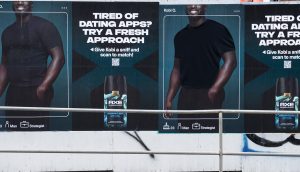U2 iPod. Playboy iBod. Heineken Podcast. Once upon a time, the iPod nation was just a bunch of people connected by white earphones. Now, thanks to the huge sales numbers from the 2004 holiday season, iPod owners are in excess of 10 million, and that has advertisers salivating over the marketing potential of Apple’s little music box.
McDonald’s, Gillette, Epson, Schneiders, Fuji, Microsoft and Best Buy have been some of the first companies to get involved in promotions and joint partnerships with the industry’s leading online music vendors, setting the table for what appears to be the next big trend in non-traditional advertising.
Since podvertising is a new and relatively unproven medium, some advertisers are wondering not only about how to effectively reach a traditionally advertiser-weary audience, but whether it is even worth trying to reach them in the first place.
Podvertising, as most marketers will tell you, has an eerie resemblance to blogs. Splashing logos and 30-second spots all over the place does more than just fail to register with audiences, it repels them.
However, Max Lenderman, VP/CD and co-founder of Montreal-based experiential marketing firm Gearwerx (which counts DaimlerChrysler and Unilever Canada among its clients), believes that the opportunity for advertisers to reach iPod users is out there, if (and granted it’s a big if) advertisers can produce content in which the exchange value outweighs the annoyance value.
Lenderman points to the success of Nike’s Art Of Speed blog campaign to illustrate his point, adding that for advertisers to thrive they need to understand that they cannot hijack the medium, they must work with the medium in an organic, non-intrusive way.
While many of Canada’s media buyers and planners are taking a wait-and-see approach with podvertising, some brands are taking the initiative to reach iPod’s coveted early adopter community before the bandwagon picks up steam. Lenderman points to some current successes in podvertising including brand-sponsored exclusive content featured on digital music stores such as iTunes, arguing that users will be willing to listen to a little commercial if it means having access to music you can’t get anywhere else.
Podcasting, the latest buzzword to come out of the iPod community, has seen rapid growth in recent months with companies like Heineken, and radio stations like New York’s WNYC jumping on board to produce weekly and daily shows with advertiser-sponsored content.
Other big-time brands are getting involved in non-traditional ways. Mercedes-Benz and Apple have joined forces to promote a new iPod integrated system in Mercedes’ high-end vehicles. The symbiotic relationship of the two marketing powerhouses is expected to result in a strengthening of the brands with consumers appreciating both the service being provided to them and the weight the brands carry as a result of the partnership.
In terms of what’s on the horizon for iPod, sales are growing exponentially. Apple sold half of all its iPod units in the months leading up to Christmas, and with the iPhoto hardware upgrade available on new models, and highly publicized rumours of a Flash-based iPod hitting shelves in the near future, it doesn’t look like the bottom will be falling any time soon.
The problem with any new advertising initiative is of course ROI, but with more and more brands getting on board with podvertising, it isn’t going to be very long before we find whether those sitting on the sidelines will be saying ‘I told you so’ or clamoring to get a ticket on the bandwagon.























